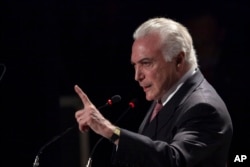Brazilian opposition senators staged a sit-in Tuesday preventing a decisive vote on labor law changes that are a crucial part of President Michel Temer's economic agenda.
The senators commandeered the leaders' table on the rostrum and prevented Senate President Eunicio Oliveira and some of his allies from taking their seats.
Oliveira responded by ordering the power and microphones cut off and he adjourned the session, leading to hours of negotiations behind the scenes while the insurgents remained in the chamber in a standoff that continued into the night.
After six hours, Oliveira restarted the session, but the opposition senators did not leave his seat. Sitting on a smaller chair, he could not use his microphone and was forced to shout to his peers to get the discussions under way.
Before the live video feed of the Senate session was cut, senators could be seen tapping on their phones and chatting with one another in a darkened room.
The spectacle underscored how acrimonious Brazilian politics have become in recent months as Temer's popularity has plummeted and a corruption charge against him has emboldened members of the opposition who believe he never should have become president. Temer took power last year after his predecessor, Dilma Rousseff, was impeached and removed as president.
Given that Temer was only voted in as vice president in the last election, many Brazilians have bristled at his push to pass a series of unpopular economic measures, including a cap on government spending, an overhaul of the pension system and a loosening of work bills through the labor law bill that was on the Senate's schedule for Tuesday.
The most significant measure in the labor changes would allow agreements negotiated between employers and workers on a range of issues to override current labor law. The bill would also make it easier to hire temporary workers, even for extended periods of time.
Oliveira and his allies are trying to put the measure that was approved in the lower house to a vote in the Senate without changes. If approved that way, the bill would go directly to the president for signature. The opposition is demanding an amendment, which would send it back to the Chamber of Deputies for another vote.
Brazilian media have been predicting the bill will pass despite opinion polls showing it is unpopular with the public. But the dramatic protest by opposition senators Tuesday was a blow to Temer that raised further questions about his ability to govern.
Allies of the president are counting on a victory on the labor law to give the president a boost before the Chamber of Deputies votes on whether to suspended him from office and put him on trial for corruption. That vote is not yet scheduled.
If two-thirds of deputies vote against Temer, lower house Speaker Rodrigo Maia would take over presidential duties while Brazil's Supreme Court decided whether to remove the president or find him not guilty.
The attorney general has accused Temer of accepting bribes from a meatpacking executive in exchange for helping the company obtain favorable government decisions. He denies wrongdoing.





